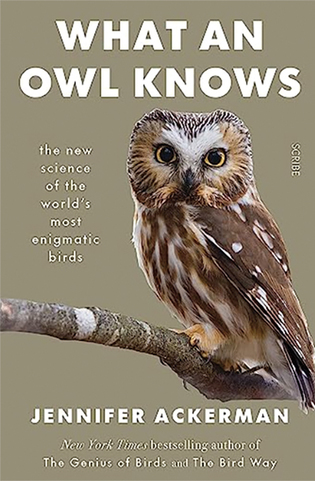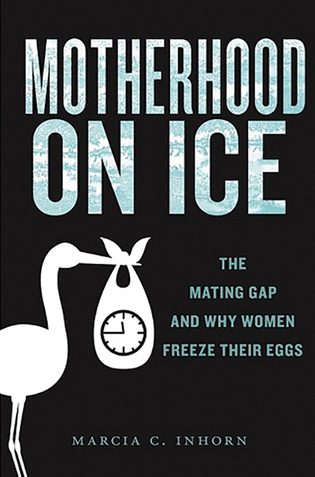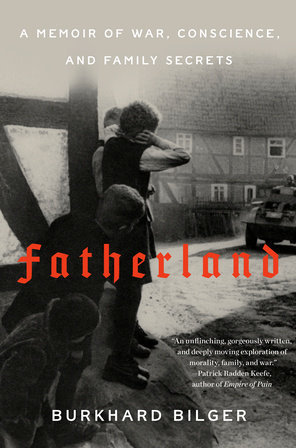
What an Owl Knows
Jennifer Ackerman ’80
Penguin Press, $30
Reviewed by Richard Prum
Some 36,000 years ago, deep in Chauvet Cave near Vallon-Pont-d’Arc, France, paleolithic humans painted hundreds of images of animals. Among them is an iconic etching of a Eurasian eagle owl peering over its back toward us. Chauvet documents that the human obsession with owls goes back to the dawn of human history. In her new book, What an Owl Knows, science writer and journalist Jennifer Ackerman ’80 provides a rich and engaging installment of strigiphilia (i.e., love of owls). The owl-infatuated will find it delightful. The owl-curious will find it revealing.
Ackerman is the author of previous books on avian intelligence behavior and on shorebirds, and she has a relaxed, assured, and informative voice. Here, Ackerman explores the biology and cultural impact of owls. The book begins with chapters on their sensory abilities, silent flight, vocalization, nesting behavior, migration, and more. She concludes with chapters on what we can learn from captive owls, and the deep impact of owls on human cultures and art, from Chauvet to Hogwarts.
Almost rivaling Ackerman’s owls are her indelible portraits of people who study them: the veteran owl biologist enthralled as a child by an Eastern screech owl calling from atop his pup tent; the retired heart surgeon who fell in love with the disorder and chaos of the forest at night; and the disabled musician whose perfect pitch allows her to identify owls individually by their calls. I will never forget them.
The intrigue of owls is that so much of their lives remains hidden to us. They can be darn hard to encounter in the wild, and every encounter leaves us wanting more. Having seen more than a quarter of the world’s nearly 250 species of owls myself, many chapters of Ackerman’s book left me itching to hike snowy mountain trails in Montana, book airplane tickets to Serbia, and explore limestone cliffs in Australia. Her description of the intimate “soft talk” between courting Northern pygmy owls gave me a deep experience of FOMO—Fear of Missing Owls. So many owls, so many behaviors, so little time.
Richard Prum is the William Robertson Coe Professor of Ornithology, Ecology, and Evolutionary Biology and head curator of vertebrate zoology (Ornithology).
__________________________________________________________________

The Mating Gap and Why Women Freeze Their Eggs
Marcia C. Inhorn
NYU Press, $30
Reviewed by Randi Hutter Epstein ’90MD
The strange world of making babies with technology and hormones has been celebrated and critiqued in nonfiction and fiction, in memoirs, histories, and biographies. Few of these, if any, have provided readers the unique and surprising insights in Motherhood on Ice: The Mating Gap and Why Women Freeze Their Eggs.
Marcia C. Inhorn, a Yale professor of anthropology, immersed herself into the culture of egg freezing, listening to detailed accounts from over 150 women. The result is both riveting and revealing.
What’s refreshing is the way Inhorn allows each participant to tell her own story in uninterrupted para-graphs. The women share their emotional tolls, as well as the financial and physical burdens of the journey. They also divulge why they chose this route, and whether they have regrets. Their explanations are presented with Inhorn’s own astute analysis; she introduces readers to the concept of “reproductive waithood,” referring to societal forces that shape the intentional and unintentional ways motherhood is delayed.
As in her six prior books—which are also ethnographies into reproductive health—readers will be enlightened and engrossed by her in-depth research, presented in a conversational tone. The eight chapters are divided into two parts: Motivations and Experiences. Perhaps most remarkably, Inhorn challenges the assumption that women who freeze eggs are doing so to concentrate on their careers and delay motherhood. On the contrary: she found that most women were eager to get pregnant but bemoaned the difficulty of finding a suitable mate.
Egg freezing is pricey. It’s often not covered by insur-ance. It’s available only for a slice of women who can afford the process and are willing to undergo hormone injections and invasive procedures without guarantees of success. The thawing process may fail, as may the subsequent in vitro fertilization process. Hormone shots can make you moody and bloated, along with other potentially dangerous side effects. “Oscillating between pain and empowerment,” Inhorn writes, “these stories reveal the complexity of American women’s lives as they struggle in their late thirties to preserve and extend
their fertility.”
Randi Hutter Epstein ’77, ’90MD, is writer in residence at the Yale School of Medicine and the author of Aroused, a book about hormones.
__________________________________________________________________

Fatherland: A Memoir of War, Conscience, and Family Secrets
Burkhard Bilger ’86
Random House, $28.99
Reviewed by James Ledbetter ’86
The family memoir has long been a powerful genre, but Fatherland pushes it to new heights. Burkhard Bilger ’86 was born in Oklahoma, in a recently immigrated German family. Throughout his childhood there were whispers that his maternal grandfather had been somehow involved with Nazis, but details were scarce.
The archival trail, too, was minimal at first; in many cases Nazis and their collaborators had destroyed records to hide the past. Even Bilger’s historian mother seemed disinclined to explore her father Karl’s background. As Bilger explains: “I was 28 years old when my mother first told me that her father had been imprisoned as a war criminal.” This set off a long quest to uncover a story that Bilger sees as both a literary tale and a moral imperative.
His grandfather Karl Gönner, born in the 1890s, had wanted to become a priest, but was drafted into World War I and lost an eye. After years of poverty, he became a schoolteacher in a small German village and had a relatively comfortable family life. But when the Nazis took over in 1933, there were few options beyond toeing the party line, although Karl had reservations about National Socialism. He ended up in Alsace in the late war and early postwar, and was convicted of war atrocities, though the record is murky. Sorting the truth from so many scarred, furious agendas is nearly impossible.
The book provides interviews and the history of some of Europe’s darkest modern times. It is also a meditation on identity and moral culpability. Today it is natural to adopt moral absolutism, but in the historical moment, the dividing lines were far blurrier. Fatherland is a masterpiece of research and narrative, even as it eludes easy answers.
James Ledbetter ’86 is the author, most recently, of One Nation Under Gold.
 loading
loading

